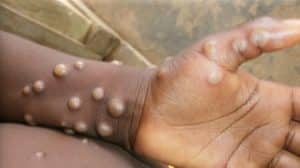Mpox, an infectious viral disease formerly known as Monkeypox, has become a cause of concern in Nigeria and other African countries.
This disease is caused by the Mpox virus, which belongs to the Orthopoxvirus genus in the family Poxviridae.
The Orthopoxvirus genus also includes the variola virus (the cause of smallpox), the vaccinia virus (used in the smallpox eradication vaccine), and the cowpox virus (used in earlier smallpox vaccines). Following the eradication of smallpox, the Mpox virus has emerged as the most significant Orthopox virus.
Mpox can cause a painful rash, swollen lymph nodes, and fever. While most people recover fully, some may become seriously ill.
The illness is usually mild, and most infected individuals recover within a few weeks without treatment.
However, cases may be severe, especially in children, pregnant women, or people with suppressed immune systems.
The disease can spread from animals to humans and between humans through close contact, respiratory droplets, and contaminated objects.
Naija News reports that the World Health Organisation recently declared Mpox a global public health emergency.
Nigeria recently received a donation of 10,000 doses of Jynneos, a Mpox vaccine, from the United States government.
According to the Africa Centres for Disease Control and Prevention (Africa CDC) the outbreak in the continent remains uncontrolled.
Africa CDC boss Jean Kaseya disclosed this during a weekly briefing on the outbreak.
“We can say today that mpox is not under control in Africa. We still have an increase in cases, which is worrying for all of us,” Kaseya said.
States With Mpox Infection
The Nigeria Centre for Disease Control and Prevention says 55 confirmed Monkeypox cases have been recorded out of 935 suspected cases across 39 local government areas in 21 states, and the Federal Capital Territory.
This is according to the Mpox situation report for week 35, ending September 1, 2024, obtained from the NCDC.
The report, however, showed that no death has been recorded from the disease so far this year.
According to the report, 70 percent of the cases were reported among males, while the female reported 30 per cent.
The age distribution of the cumulative number of confirmed Mpox cases showed that 19 cases were recorded among ages 0-10; eight cases were recorded among ages 11-20; 12 cases were recorded among 21-30; eight cases were recorded among ages 31-40; seven cases were recorded among ages 41-50; and one case was recorded among ages 50 and above.
The confirmed cases were reported in Enugu (eight); Bayelsa (six); Akwa-Ibom (six); Cross River (five); Delta (three); Benue (three); Plateau (three); Osun (two); Imo (two); FCT (two); Anambra (two); Rivers (two); Abia (two); Lagos (one); Kebbi (one); Nasarawa (one); Edo (one); Ebonyi (one); Zamfara (one); Oyo (one); Kaduna (one); and Niger (one).
Mpox Higher Among Males
According to NCDC, more males are getting infected with Mpox in Nigeria.
According to figures posted on the NCDC website 67 percent of Mpox cases recorded since January 2024 have been in males.
The agency said, “Men are predominantly affected, accounting for approximately 70 percent of 6,001 suspected and confirmed Mpox cases recorded in Nigeria since September 2017, when the first confirmed cases occurred.”
The figures released revealed that a total of 1,031 suspected cases have been reported across 47 local government areas in 23 states and the Federal Capital Territory, with 67 confirmed cases in 2024.
The NCDC highlighted that men are predominantly affected, accounting for approximately 70 percent of the 6,001 suspected and confirmed Mpox cases recorded in Nigeria since September 2017, when the first confirmed cases occurred.
However, the NCDC disclosed that there have been no fatalities from the disease in 2024, compared to two and seven deaths recorded in 2022 and 2023, respectively.
Speaking in an exclusive interview with Naija News, a health practitioner, Orji Vivian A (RN, RM, BNSc), shared her thoughts on the viral infection.
Can you describe the present Mpox outbreak?
“According to WHO, Mpox, previously known as Monkeypox, is a viral illness caused by the monkeypox virus. The impact of it on the nation, it’s a viral case and now that there is an outbreak, there is no control over it, and it may be declared a pandemic. What happens is this. It is going to affect the Ministry of Health. They would have to deploy centers that would tackle it. It is a reportable case; why I call it a reportable case is because it is a contagious case that can be spread easily. So the moment such cases are seen and identified, they are reported from the hospital to the information centers, then to the Ministry of Health, then to the global health care organization, the WHO.”
What are the primary symptoms and transmission modes of Mpox
“The symptoms, like any other disease or infection, can most often be fever. The rash is what we see most, but there is nobody that will have a rash that will not cause discomfort, which will bring up the fever. Then, there are swollen lymph nodes below your cheek, which are where the lymph nodes are. The person can also have chills; there could be a headache. There could be muscle pain and fatigue.
“Mpox can be spread from an infected person. When a non-infected person has contact with infected animals. Because it was done through animals and with an infected person. It happens through direct contact with the infected person. For instance, if the rashes burst and touched another part of the body, the rash would develop there. So someone with it has body contact with someone that does not have it but has a break in their own skin, the moment they have body contact with their fluid, then there could be sores. Also, through droplets. That is why we teach people to cough with their elbows. So they don’t spread the droplets into the air for people that have low immunity to contact it.”
What measures are being taken to contain Mpox in Nigerian hospitals?
“We always say security is everyone’s business, likewise health. The moment anybody has any ailment, no matter what is seen, especially now it is almost like chicken pox until proven otherwise. The moment anyone like that with rashes is seen, the person has to be directed or reported to the hospital. They should avoid medication. Anyone that is seen probably has a fever or rashes, and you ask other questions. They should report to the hospital. In this situation, treatment can be implemented. And this can last two weeks to 1 month, and it goes away.
“We do what we call barrier nursing. This barrier nursing means we put them in isolation and give them the necessary care. We ensure that we do what we call infection, prevention and control. If you identify such a person as a caregiver, you should put on your personal protective equipment, like your face mask, apron, goggles, and gloves. So that if there is any splash of body fluid from the infected person, it will not get to the healthcare provider. After attending to such patients, you de-robe and dispose of it appropriately. Then you wash your hands so that you don’t get yourself infected or others.”
How effective is the vaccine?
“Well, I heard that there is a vaccine, but I have not seen it or encountered anyone who has used it.”
What challenges do health officials face when dealing with Mpox patients?
“African mentality, anytime a person falls sick, our people believe more in myth than reality. Before most of these people come for treatment, they are already down. So sometimes it is difficult to take care of these people; as I told you before, it is within two weeks to four weeks that the person can have it and then recover, and before you get these people from the community, it is almost late because they would have been treating so many things. Another challenge is that as we are being exposed because we don’t turn down any case, we can’t turn down any case; we need the government to support us, especially in our health hazard allowances.
“If someone falls sick from all these occupational hazards, one can’t take care of themselves. Because most of the time, you will be left to cater to yourself. And then all this personal protective equipment sometimes would not be available, and due to the way these patients come in when they are already down, as I earlier told you. Sometimes, they come in as an emergency at night. By the time you are rushing to take care of them you have already made so many body contacts with them.
“By the time the diagnosis is being made, you realize you have touched what you are not supposed to touch, and most times, some of these gears are not readily available to use.”
What measures can you suggest that the non-infected take to prevent infection?
“From primary schools, we encourage teachers to teach children how to cough and sneeze. There was a time when we taught them that instead of giving a handshake, we give knuckles. Then, instead of hugging, we can wave because of body contact and the moment you see anyone having a headache or fever. We encourage them to report. Most people do not go to government hospitals where these cases can be handled.
“The moment a person has a fever 2- 3 days and you use paracetamol, but there is no relief, the person should see a healthcare professional in the hospital.”
The post Mpox In Nigeria: Understanding Symptoms, Transmission And Prevention appeared first on Naija News.








